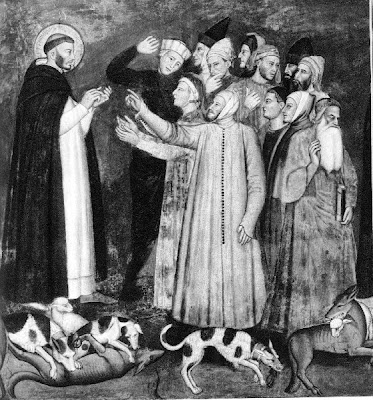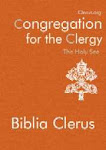One of our chapter members has been engaged in an email discussion with a Baptist whom I will call “Fred,” who has written extensively and with presumed authority, establishing rules by which the Holy Scriptures are to be understood. This is just a look at a corner of
The Gospel according to Fred:
I do depend with my heart upon that great Teacher that Jesus promised would lead the dedicated, studious, and committed child of God into "all truth," (John 14:16-17; 15:26; 16:7-16)!
Looking at this statement using Fred's rule; “consider every passage under these guidelines: Who is talking, who is being taught”
14:16. And I will ask the Father: and he shall give you
another Paraclete, that he may abide with you for ever:
14:17. The spirit of truth, whom the world cannot receive,
because it seeth him not, nor knoweth him. But you shall
know him; because he shall abide with you and shall be in
you.
In Fred’s first citation, Jesus is speaking, the Apostles are being spoken to. Here is a record of a promise made to them (the Apostles) forever, which in the Church for almost 2000 years has been continuously interpreted to mean “the Apostles and their successors.” Fred has chosen to interpret it to mean the promise is made to the “dedicated, studious, and committed child of God” This is an interpretation completely without support in the text. In fact, the condition applied is not being studious or dedicated or committed, but “keep my commandments” (Jn 14:15).
15:26. But when the Paraclete cometh, whom I will send you
from the Father, the Spirit of truth, who proceedeth from
the Father, he shall give testimony of me.
Jesus is speaking, the Apostles are present, and to them He makes a promise. In order to apply this to ourselves, we have to insert an interpretation into these words. No where is there a clear statement that the “dedicated, studious, and committed child of God” will be led “into all truth” Fred has made an leap from the Apostles to himself, and then from “testimony of me” to “all truth”
Fred’s last leap is even more extensive (Jn 16:7-16).
16:12. I have yet many things to say to you: but you cannot
bear them now.
16:13. But when he, the Spirit of truth, is come, he will
teach you all truth. For he shall not speak of himself: but
what things soever he shall hear, he shall speak. And the
things that are to come, he shall shew you.
Jesus is clearly speaking to the Apostles. Fred believes he personally is being taught that he is in possession of the Holy Spirit’s personal guidance into all truth (John 16:13) rather than there are many things which he, Fred, cannot bear (John 16:12). We can test this, as John has elsewhere instructed us to (1 Jn 4:1) when spirits are claimed.
Now, if Fred is lead by the Holy Spirit to “all truth,” then because Truth is Truth, and Truth is One, there will be agreement in Truth between Fred and every other Christian (actually and in fact) led by the Holy Spirit to “all truth.” If there is disagreement between those who claim to be led by the Holy Spirit to Truth, then one or both are in error, having not yet arrived at truth. Since I can easily find a Christian making the same claims as Fred, and yet disagreeing with him, how am I to tell the difference? Who really has the truth, and who is in error?
The bible bears testimony of the place to find the answer, although Fred rejects it because Fred does not really believe the bible, Fred believes what he thinks the bible means.
1 Tim 3:15. But if I tarry long, that thou mayest know how thou
oughtest to behave thyself in the house of God, which is
the church of the living God, the pillar and ground of the
truth.


























